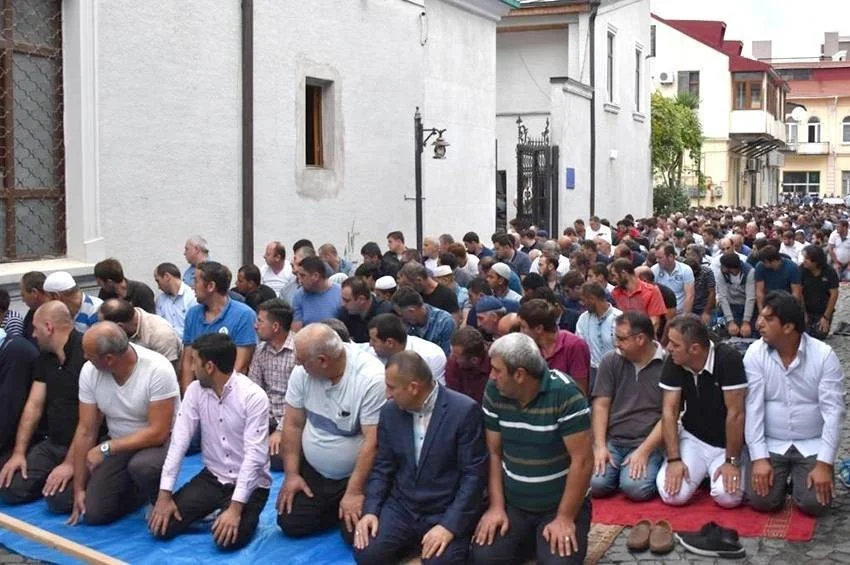Batumi New Mosque Stuck in Legal Limbo
The Muslim community has made a valid request to construct the new mosque in Batumi, but the matter has remained unresolved for seven years. The lawyers and the community believe that the government has been posing regulatory obstacles to prevent the construction, forcing believers to gather and pray in the open air. The Muslim community announced that they would continue to protect their fundamental rights in a legal way, for which they will use all local and international legal mechanisms.
On May 25, the Supreme Court ruled on the matter. The Batumi New Mosque Construction Fund, the Tolerance and Diversity Institute (TDI), and the Social Justice Center (SJC) raised concerns regarding this decision, saying it was a step back from the previous rulings by the Batumi City Court and Kutaisi Court of Appeals.
The Supreme Court Decision, said TDI and SJC, “not only hinders the realization of the fundamental rights of Muslims but also could lead to the undermining of the general principles of the right to freedom of religion and equality under the law.”
Background of the Case
On September 30, 2019, Batumi City Court ruled that the City Hall’s refusal to grant the construction permit for the mosque was invalid. On April 13, 2021, the Kutaisi Court of Appeals upheld this decision. However, both courts rejected the Muslim community’s direct request to compel the city hall to grant the first phase of the permit, opting instead to send the case back for reconsideration.
On May 25, 2023, the Supreme Court of Georgia reviewed the case on appeal. The Supreme Court partially agreed with the Muslim community, acknowledging the discrimination they faced. It stated that the Court of Appeals should have taken action to address the discriminatory effect rather than sending the case back to the City Hall. However, the Supreme Court did not directly order the City Hall to issue a building permit. Instead, it returned the case to the Court of Appeals for reconsideration.
In the vicinity where the plaintiff requested permission for a mosque, there are a total of seven Georgian Orthodox churches, three of which are situated on land owned by Batumi Municipality. The Supreme Court partially granted the cassation appeal of Batumi City Hall. The Court cited the absence of permits for Orthodox churches in the same residential zone as the proposed mosque, emphasizing their unauthorized construction. Arguing thus that “there was no clear differential treatment” of the Muslim community, the court relied on the General Administrative Code, which prohibits different decisions in similar circumstances.
Concerns Raised by the Social Justice Center
The SJC, representing the Muslim community, expressed significant reservations regarding the Supreme Court Decision. The Center believes that the decision hinders the realization of fundamental rights for Muslims and undermines religious freedom and equality.
These are the key reasons for criticism:
- The lengthy trial, which has already lasted seven years, will be extended indefinitely by the latest decision, which “grossly violates the rights of the Muslim community and threatens the fundamental principle of speedy and effective justice.”
- The argumentation of the Supreme Court is controversial in presenting contradictory arguments and interpretations. The court’s reasoning regarding the unauthorized construction of Orthodox churches, based on a misinterpretation of Article 7 of the Constitutional Agreement with the Church, is concerning.
- The Court’s stance on discrimination sets a dangerous precedent. The Supreme Court’s reasoning, which suggests that there is no unequal treatment between the Orthodox Church and Muslims due to the lack of a zoning agreement, overlooks the broader issue of discrimination where one group (the Muslim community) is subjected to permit requirements. In contrast, the unauthorized construction by another group (Orthodox Christians) is permissively disregarded.
Additionally, the center criticizes the misuse of specific decisions of the European Court of Human Rights in the Supreme Court’s judgment. According to the center, these references are taken out of context and incorrectly applied, lowering human rights standards and undermining the principle of freedom of religion.
This post is also available in: ქართული Русский
